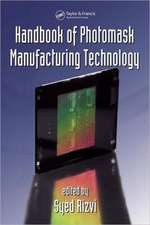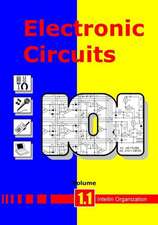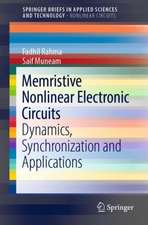Brain-Machine Interface: Closed-loop Bidirectional System Design
Autor Xilin Liu, Jan Van der Spiegelen Limba Engleză Hardback – 27 oct 2017
| Toate formatele și edițiile | Preț | Express |
|---|---|---|
| Paperback (1) | 780.54 lei 38-44 zile | |
| Springer International Publishing – sep 2018 | 780.54 lei 38-44 zile | |
| Hardback (1) | 1004.19 lei 6-8 săpt. | |
| Springer International Publishing – 27 oct 2017 | 1004.19 lei 6-8 săpt. |
Preț: 1004.19 lei
Preț vechi: 1224.62 lei
-18% Nou
Puncte Express: 1506
Preț estimativ în valută:
192.18€ • 199.89$ • 158.65£
192.18€ • 199.89$ • 158.65£
Carte tipărită la comandă
Livrare economică 14-28 aprilie
Preluare comenzi: 021 569.72.76
Specificații
ISBN-13: 9783319679396
ISBN-10: 3319679392
Pagini: 242
Ilustrații: XXXIII, 242 p. 213 illus., 158 illus. in color.
Dimensiuni: 155 x 235 mm
Greutate: 0.57 kg
Ediția:1st ed. 2018
Editura: Springer International Publishing
Colecția Springer
Locul publicării:Cham, Switzerland
ISBN-10: 3319679392
Pagini: 242
Ilustrații: XXXIII, 242 p. 213 illus., 158 illus. in color.
Dimensiuni: 155 x 235 mm
Greutate: 0.57 kg
Ediția:1st ed. 2018
Editura: Springer International Publishing
Colecția Springer
Locul publicării:Cham, Switzerland
Cuprins
Introduction.- Neural Recording Front-end Design.- Neural Feature Extraction.- Neural Stimulator Design.- Bidirectional Neural Interface and Closed-loop Control.- System Integration and Experiments.- Conclusion and Future Direction.- Appendix.- Bibliography.- Index.
Notă biografică
Xilin Liu received the B.S. degree in Electrical Engineering from the Harbin Institute of Technology, China, in 2011. He received the M.S. and the Ph.D. degrees in Electrical Engineering from the University of Pennsylvania in 2013 and 2017, respectively. He joined Qualcomm Inc. in 2017. His research interests include analog and mixed-signal integrated circuits and system design for medical applications, brain-machine interface, data converters, and CMOS sensors.
Dr. Liu received the IEEE Solid-State Circuits Society (SSCS) 2015-16 Predoctoral Achievement Award, the Best Student Paper Award of the 2017 International Symposium on Circuits and Systems (ISCAS), the Best Paper Award (1st place) of the 2015 Biomedical Circuits and Systems Conference (BioCAS), and the Best Paper Award of the BioCAS Track of the 2014 International Symposium on Circuits and Systems (ISCAS).
He is also the recipient of the Student-Research Preview Award (Honorable Mention) of the 20
14 IEEE International Solid-State Circuits Conference (ISSCC).
Jan Van der Spiegel is a Professor of the Electrical and Systems Engineering, and the Director of the Center for Sensor Technologies at the School of Engineering and Applied Science at the University of Pennsylvania. He is the former chair of the Electrical Engineering and interim chair of the Electrical and Systems Engineering Departments. Dr. Van der Spiegel received his Master's degree in Electro-Mechanical Engineering and his Ph.D. degree in Electrical Engineering from the University of Leuven, Belgium, in 1974 and 1979, respectively.
His primary research interests are in mixed-mode VLSI design, bio-inspired CMOS vision sensors, biologically based image sensors and sensory information processing systems, and brain-machine interface electronics. He has published over 2
50 journal and conference papers, and is the co-author of 8 U.S. patents. He is a life fellow of the IEEE, received the IEEE Major Educational Innovation Award, and is the recipient of the IEEE Third Millennium Medal, the UPS Foundation Distinguished Education Chair and the Bicentennial Class of 1940 Term Chair. He received the Christian and Mary Lindback Foundation, and the S. Reid Warren Award for Distinguished Teaching, the IBM Young Faculty Development Award and the Presidential Young Investigator Award. He has served on several IEEE program committees (IEDM, ICCD, ISCAS, and ISSCC) and was the technical program chair of the 2007 International Solid-State Circuit Conference (ISSCC 2007).
Dr. Van der Spiegel is an associate Editor of the IEEE Tr. of Biomedical CAS, and section Editor of Electrical and Electronic Engineering of the J. of Engineering of the IET, and
former Editor of Sensors and Actuators A for North and South America. He has been the chair of the IEEE SSCS Chapters committee from 1998 to 2015. He is currently the President of the IEEE Solid-State Circuits Society. He is a member of Phi Beta Delta and Tau Beta Pi. He spent a six-month sabbatical at Tsinghua University, Beijing, as a distinguished visiting scholar in 2017-2018.
Dr. Liu received the IEEE Solid-State Circuits Society (SSCS) 2015-16 Predoctoral Achievement Award, the Best Student Paper Award of the 2017 International Symposium on Circuits and Systems (ISCAS), the Best Paper Award (1st place) of the 2015 Biomedical Circuits and Systems Conference (BioCAS), and the Best Paper Award of the BioCAS Track of the 2014 International Symposium on Circuits and Systems (ISCAS).
He is also the recipient of the Student-Research Preview Award (Honorable Mention) of the 20
14 IEEE International Solid-State Circuits Conference (ISSCC).
Jan Van der Spiegel is a Professor of the Electrical and Systems Engineering, and the Director of the Center for Sensor Technologies at the School of Engineering and Applied Science at the University of Pennsylvania. He is the former chair of the Electrical Engineering and interim chair of the Electrical and Systems Engineering Departments. Dr. Van der Spiegel received his Master's degree in Electro-Mechanical Engineering and his Ph.D. degree in Electrical Engineering from the University of Leuven, Belgium, in 1974 and 1979, respectively.
His primary research interests are in mixed-mode VLSI design, bio-inspired CMOS vision sensors, biologically based image sensors and sensory information processing systems, and brain-machine interface electronics. He has published over 2
50 journal and conference papers, and is the co-author of 8 U.S. patents. He is a life fellow of the IEEE, received the IEEE Major Educational Innovation Award, and is the recipient of the IEEE Third Millennium Medal, the UPS Foundation Distinguished Education Chair and the Bicentennial Class of 1940 Term Chair. He received the Christian and Mary Lindback Foundation, and the S. Reid Warren Award for Distinguished Teaching, the IBM Young Faculty Development Award and the Presidential Young Investigator Award. He has served on several IEEE program committees (IEDM, ICCD, ISCAS, and ISSCC) and was the technical program chair of the 2007 International Solid-State Circuit Conference (ISSCC 2007).
Dr. Van der Spiegel is an associate Editor of the IEEE Tr. of Biomedical CAS, and section Editor of Electrical and Electronic Engineering of the J. of Engineering of the IET, and
former Editor of Sensors and Actuators A for North and South America. He has been the chair of the IEEE SSCS Chapters committee from 1998 to 2015. He is currently the President of the IEEE Solid-State Circuits Society. He is a member of Phi Beta Delta and Tau Beta Pi. He spent a six-month sabbatical at Tsinghua University, Beijing, as a distinguished visiting scholar in 2017-2018.
Textul de pe ultima copertă
This book provides an introduction to the emerging area of “Brain-Machine Interfaces,” with emphasis on the operation and practical design aspects. The book will help both electrical & bioengineers as well as neuroscience investigators to learn about the next generation brain-machine interfaces. The comprehensive review and design analysis will be very helpful for researchers who are new to this area or interested in the study of the brain. The in-depth discussion of practical design issues especially in animal experiments will also be valuable for experienced researchers.
ace; many innovations in the circuit design optimized for the characteristics of neural interface and electrode-electrolyte interface.
- Provides readers with background on brain-machine interfaces, a summary of design requirements, and circuit and system design examples;
- Presents the first comprehensive study of closed-loop bidirectional BMI’s for freely behaving animals;
- Demonstrates the first reported portable system to provide all necessary hardware for a closed-loop sensorimotor neural interf
Caracteristici
Provides readers with background on brain-machine interfaces, a summary of design requirements, and circuit and system design examples Presents the first comprehensive study of closed-loop bidirectional BMI’s for freely behaving animals Demonstrates the first reported portable system to provide all necessary hardware for a closed-loop sensorimotor neural interface; many innovations in the circuit design optimized for the characteristics of neural interface and electrode-electrolyte interface Includes supplementary material: sn.pub/extras



















